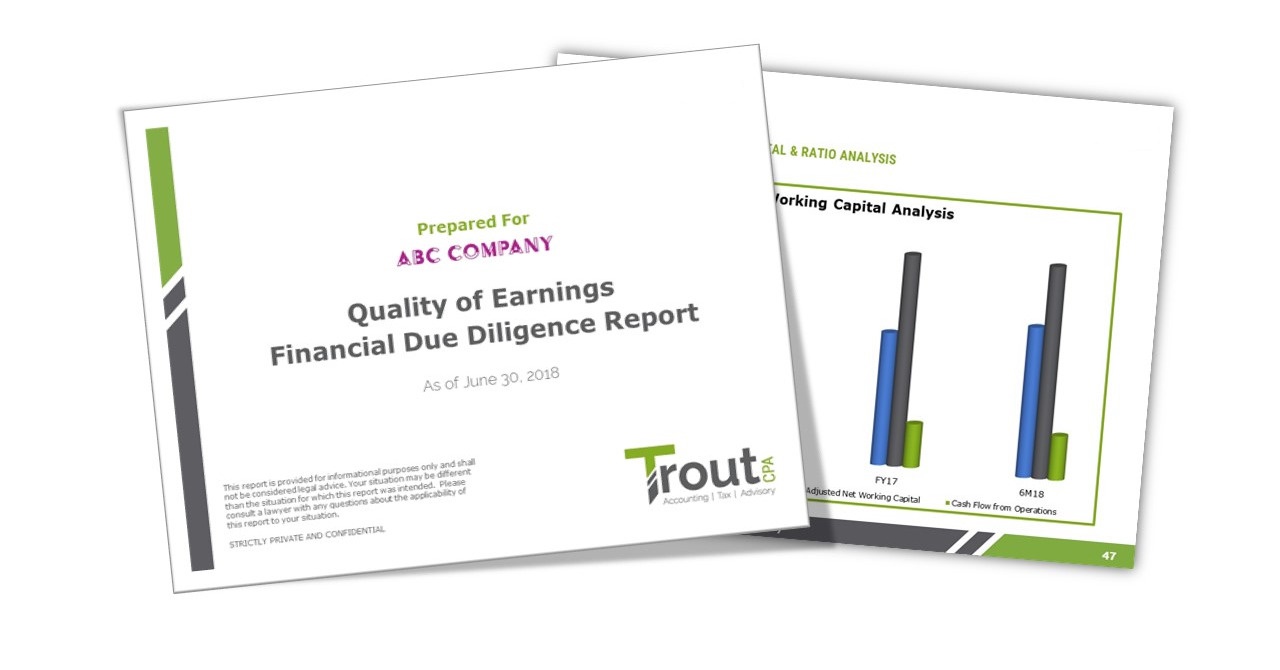Preparing to sell a business can be a formidable task. It involves finding a suitable buyer and managing a time-intensive process while continuing to run the business at a high level. This can cause owners to feel overwhelmed and uncertain about the best way to approach the sale process. Fortunately, there are steps that business owners can take to make the process less stressful and to help maximize the value of their business in a transaction. These steps and recommendations can be implemented over time and will position the company for a more seamless transaction, whether selling to an internal buyer, a financial buyer, or a strategic buyer.
Trout CPA's team of M&A advisors recommends starting with a comprehensive readiness assessment when working with owners preparing to exit their business. This assessment includes evaluating several areas of focus to ensure alignment among all parties.
One of the most critical steps in any readiness assessment is to understand the personal and financial goals of the owner intimately. Selling a business is a deeply personal process. Any potential sale will impact not only employees and management but also the owner's future role in the company, which can be significantly different depending on the buyer. As experienced advisors, we can model strategic alternatives in an effort to identify the most appropriate transaction outcome.
Another essential assessment step is undertaking a succession or talent management review that supports the exiting shareholder's goals. If the seller's goal is to step away from the business immediately, then the executive team should be both capable and informed of the overall succession plan. If the owner(s) have already stepped back from day-to-day management, then this aspect of the assessment becomes less important, assuming the management team has been successful in running the business without the owner's/owners' presence. Nonetheless, many owners have deep client relationships and institutional knowledge that may be lost if they were to step away suddenly. Any buyer would identify these issues and attempt to address possible solutions in structuring the transaction. Retaining the owner as an employee for a transitional period is particularly common among financial buyers, such as private equity firms. Most commonly, we see these arrangements memorialized in a consulting or employment agreement that ranges from six months to two years. Buyers will often relieve the selling owners of the responsibilities they grew to dislike as owners and embolden them to return to the things that enable the highest and best use of their time and talents. For many, this means managing client relationships and pursuing strategic initiatives. In those cases, selling owners might feel a sense of relief and rejuvenation from working alongside the new buyer for many years.
Assessing a company's financials, internal systems, and controls is another crucial component of a pre-sale assessment. Valuation heavily weighs the business's historical and future cash flows. Most commonly, this is measured using EBITDA as a proxy for cash flow. Any inadequacies a potential buyer perceives will result in a downward adjustment to the valuation multiple applied against EBITDA (e.g., reducing the purchase price from 6x to 5.25x). The quality of the seller's financials will be closely scrutinized to ensure that the accounting results being presented are accurate. Whether a company has audited, reviewed, or internally prepared financial statements, a sell-side Quality of Earnings (QoE) report is highly recommended and has become customary in the M&A market. A QoE report is a detailed study of a company's earnings, notably EBITDA. This analysis will drill into the key drivers of a company's financial results, including business segment profitability, customer concentration and retention, CapEx patterns, net working capital trends, and other matters. Sellers can set the narrative and avoid surprises by conducting a sell-side QoE. During diligence, sellers will need to provide timely monthly financial statements, work-in-progress reports, accounts receivable/accounts payable reports, customer purchasing data, payroll reports, tax returns, and documentation for vendor contracts, customer contracts, lease agreements, and loan agreements. Starting the process early, by locating and indexing these items, sellers can avoid the rush to fulfill buyer's data requests during diligence. (Read more about the Top Advantages of Sell-Side Due Diligence).
Practically speaking, it has been our experience that someone in the finance/accounting function needs to be "in the know" during the transaction. Owners often do not have the time or knowledge to singlehandedly address the information requests and resulting questions during the sale process. While we appreciate confidentiality concerns and the general inclination to keep the circle small, it is critical to have certain members of management involved in the sale process. One way to address owners' concerns that anxious employees might leave during the sale process is by offering "transaction bonuses" as incentives to retain key staff and maintain their motivation and involvement.
Given the fact that many closely held businesses also own real estate, either directly or by common ownership, it is important to consider how this relationship fits into the sale of an operating company. Often, financial buyers have no interest in purchasing real estate. Instead, they prefer to enter into fair market value (FMV) lease agreements. As a seller, this can provide a stream of passive income as a landlord. It should be stated that there can be a valuation adjustment to the purchase price depending on the lease terms stipulated in a related party lease arrangement. For example, if FMV rent is $200 thousand per year and the operating company is paying $125 thousand per year, the valuation for the operating company will likely be reduced in a corresponding manner (e.g., $75 thousand x 5.25 multiple = $394 thousand purchase price reduction). As a seller, keep the perspective that this is logical and customary. If you will now be the landlord enjoying a higher FMV rental income stream, then it only makes sense to concede that this increased expense on the operating company is going to reduce its value, which in turn reduces the purchase price.
Lastly, we would be remiss to skip the topic of compensation. As with related party real estate leases, there is a similar valuation dichotomy with the compensation of owners and executives. If owners or executives seek to negotiate higher compensation packages post-transaction, the operating company is going to produce less cash flow. Accordingly, it then stands to reason that most buyers are going to make a purchase price reduction to accommodate the reduced pro forma EBITDA that the selling company will generate.
In both instances, rent for real estate or compensation for employees, the opposite is true if amounts being paid exceed FMV or the agreed-upon terms post-transaction. In those cases, sellers should rightfully expect purchase price credits going the other direction.
While this article merely scratches the surface, Trout CPA's team of M&A advisors would be more than happy to help shepherd owners through the sale process. As one final piece of advice, start these conversations sooner than you think is necessary. It will pay dividends, literally and figuratively.







